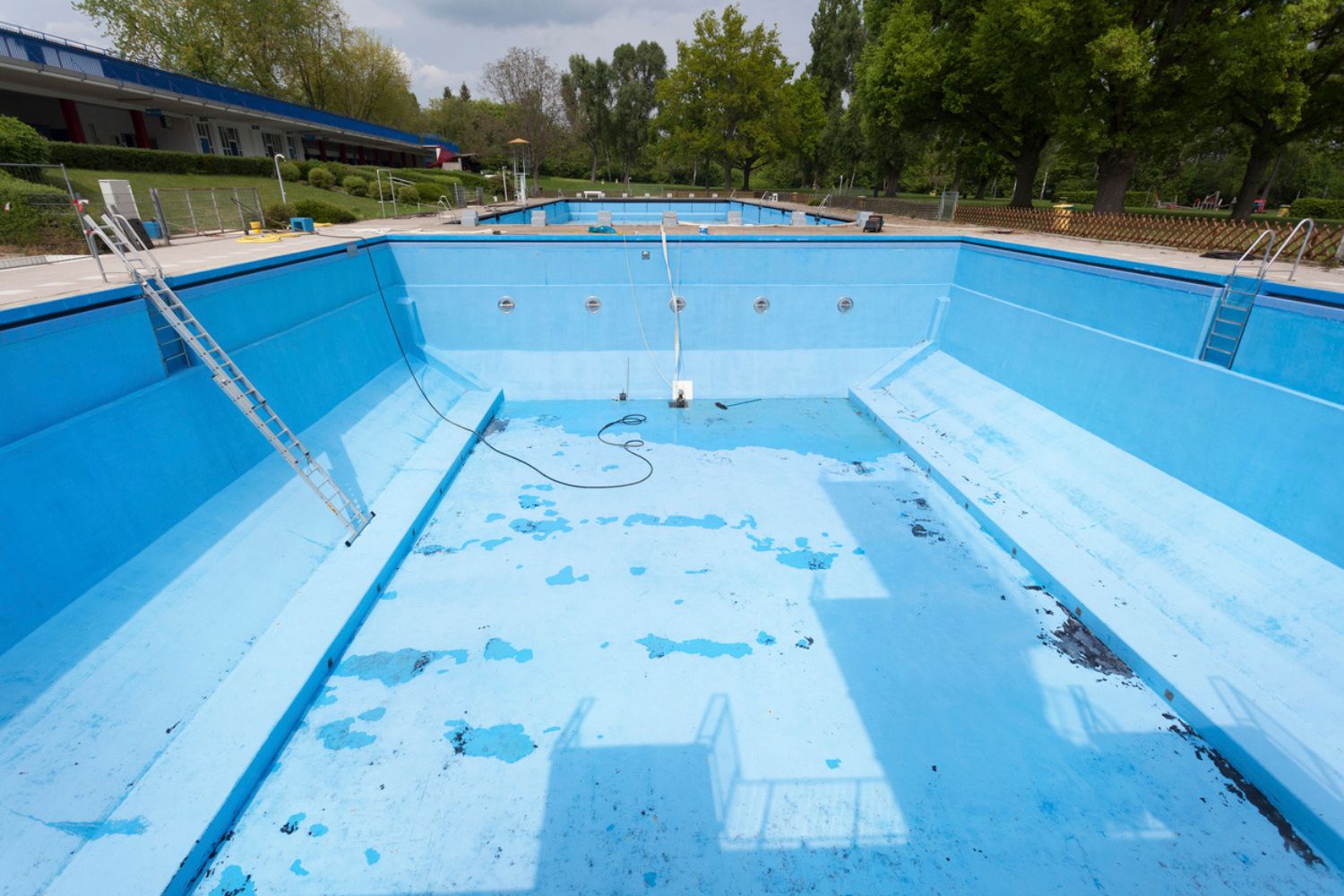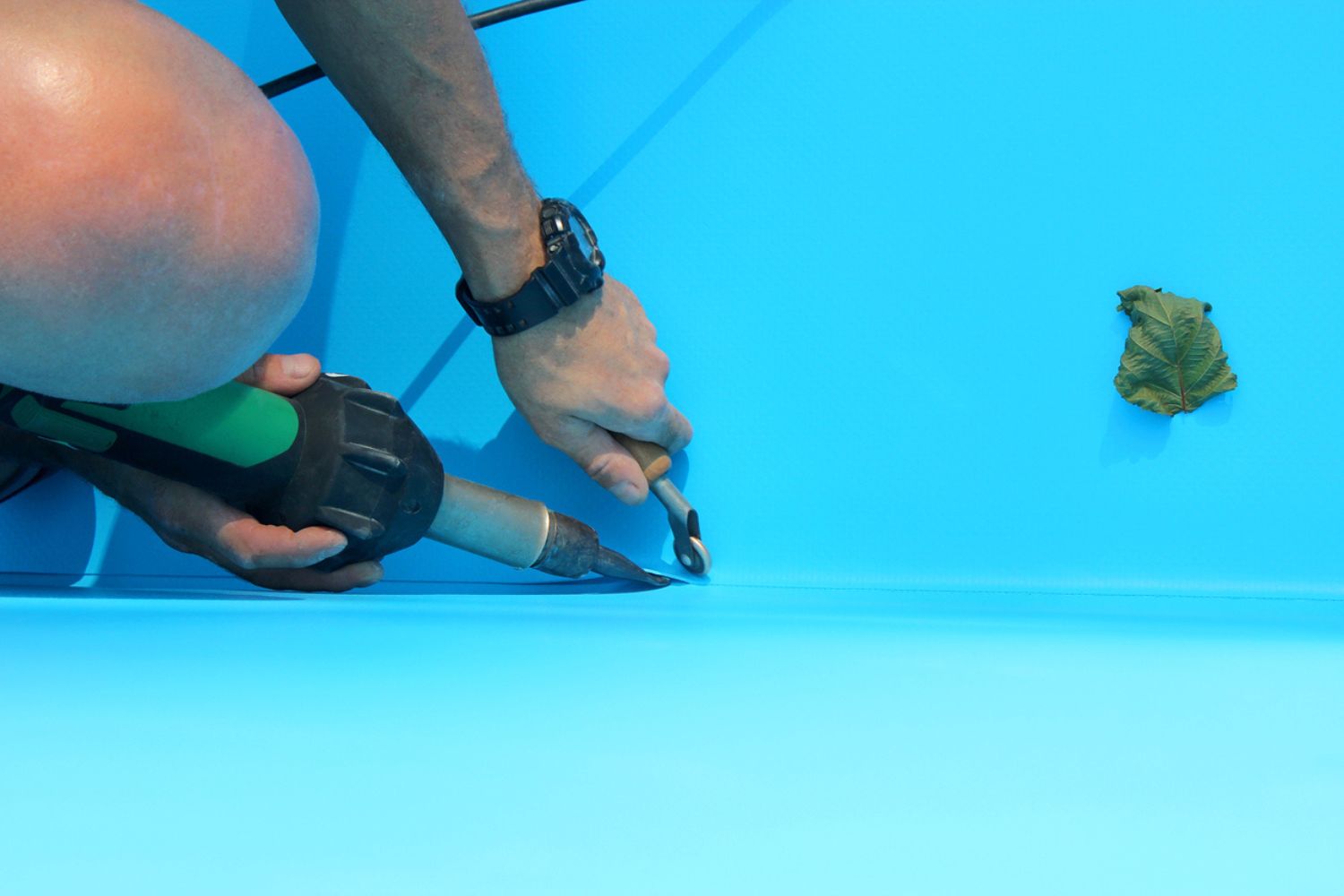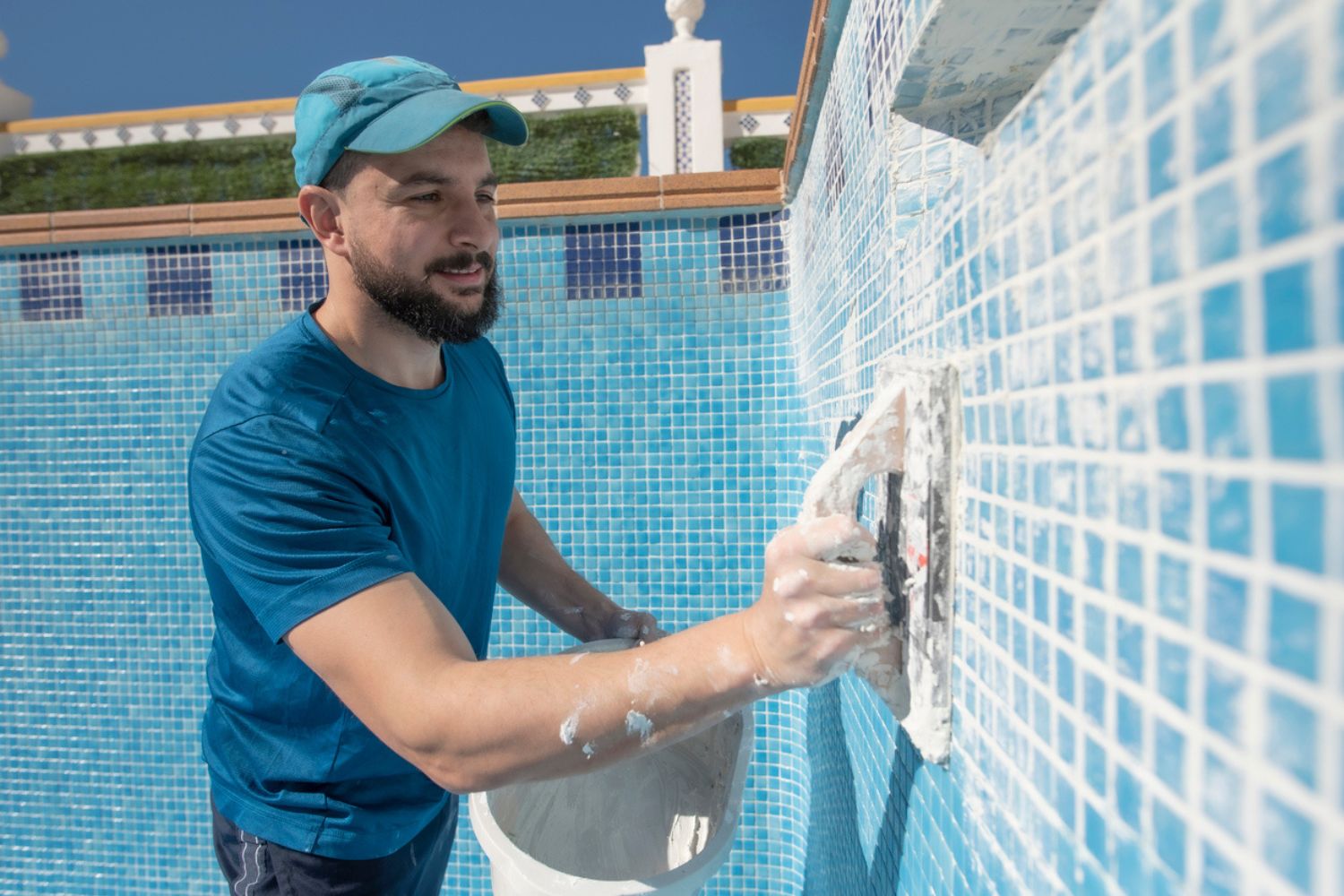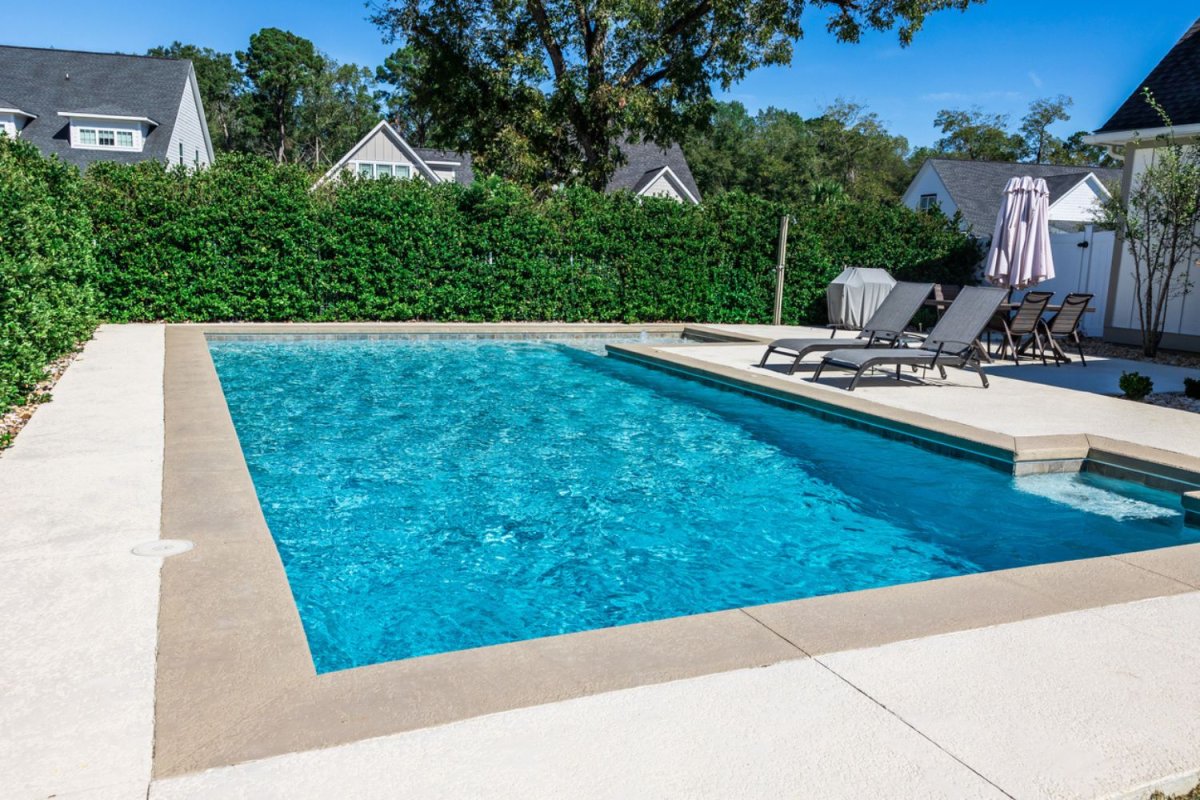We may earn revenue from the products available on this page and participate in affiliate programs. Learn More ›
Highlights
- Swimming pool leak repair typically costs between $10 and $3,500.
- Costs will vary depending on the size and type of the pool, the type of liner, leak detection services, the location of the leak, the cost of labor, the cost to drain and refill the pool, and any additional pool repairs that are needed.
- A pool may have a leak that needs to be repaired if the owner notices increased water bills, visible cracks or damage, wet areas in the yard or under the pool equipment, decreased chemical levels, or discoloration or algae growth in the pool water.
- A minor leak could be repairable as a DIY project if the homeowner has a pool patch kit, but large leaks or unidentified leaks will require professional repair.
Having a pool can transform a backyard space into a relaxing oasis. Despite the maintenance that comes with the normal wear and tear from using a pool, leaks can still happen. Maintaining a pool to keep it in good condition requires swift leak repair service so a small leak doesn’t turn into a larger problem. Swimming pool leaks can lead to costly water bills and property damage if they’re not taken care of as quickly as possible. How much does pool leak repair cost? According to Angi, swimming pool leak repair ranges from $10 to $3,500, depending on the size of the leak, the extent of the damage, and the type and size of the pool. A pool leak repair service will usually need to drain the pool to repair the leak, and this can cost from $180 to $230 on average. Refilling a pool typically costs about $55 per 5,000 gallons of water, and adding and balancing the pool chemicals after the pool has been refilled can cost approximately $450. Homeowners will want to keep in mind that the draining, refilling, and water chemical costs are in addition to the pool leak repair cost when budgeting for pool leak repair.
While both above-ground and inground pools require similar maintenance, each type of pool needs its own types of repairs. Above-ground pool leak repair is a bit different from inground pool leak repair, and repairing above-ground pools is typically less expensive because it usually takes less time to find a leak and fix it. Many pool repair professionals charge between $45 and $65 per hour, but labor prices can vary depending on location, the complexity of the repair, the season, and the demand for pool repair services. This guide will examine the important factors that influence pool leak repair cost, the difference in repair costs based on the type of pool, red flags that signal a pool needs leak repair, how to save money on pool leak repair, and some important questions to ask a pool repair professional before making a decision on who to hire to fix a leak.

Factors in Calculating Pool Leak Repair Cost
Even after hiring one of the best pool installation companies to install a pool and taking care while performing regular maintenance, leaks can still happen. If this is a concern for homeowners, they can look into the best home warranties for pool coverage (such as Choice Home Warranty or American Home Shield) ahead of time to see if leak repairs are typically covered. While the average price range to repair a pool leak runs from $10 to $3,500, many homeowners will find that the overall price can vary due to several important factors. These can include pool size, pool and liner type, leak detection, leak location, local labor pricing, draining and refilling costs, and any additional pool repairs.
Pool Size
In many cases, the pool size can influence the price of repairs. Parts for a larger pool are typically more expensive than for a smaller pool, and repairing or replacing those parts will cost more. Pools that are larger require more materials for repairs than those that are smaller. Since many types of repairs are based on linear footage or square footage, the larger the area that’s leaking, the more expensive repairs will be.
Pool and Liner Type
Inground pool leaks typically cost more to repair than leaks in above-ground pools. Concrete pool leak repair is usually the most expensive since the repairs are labor-intensive and time-consuming. Vinyl liner repairs are generally on the lower end of the leak repair cost range, followed by fiberglass liners. Details regarding above-ground, concrete, fiberglass, inground, and vinyl pool leak repair appear in a section below.
Leak Detection
Pool leak detection and repair costs from $100 to $500, depending on the location of the leak and the cause of the leak. While many pool repair professionals charge by the project, some can charge by the hour, which can range from $75 to $125 per hour for leak detection. Leak repairs for an above-ground pool are usually less expensive than for an inground pool. If a leak is behind tile or in a pipe that’s buried underground, it takes more time and effort to detect it and repair it. A leak detection test can determine exactly where the leak is, and pool technicians can use ultrasound equipment or water dye to locate the exact area of the leak. Some steps that homeowners can take to make it easier on a pool technician to find a leak is to clean all debris from the pool water, remove any flotation devices and toys from the pool, and ensure that the water is clear and the chemicals are properly balanced for safe swimming.
Since leaks are a sign that pool equipment is damaged or failing, it’s important to remedy the leak as soon as possible. If a pipe or light seal is damaged, it can cause a leak that will eventually be detrimental to the pool equipment. Leaks can be harmful to landscaping, and they can also cause high water bills.
Leak Location
There are many different locations where a pool leak can happen, and each location has its level of difficulty for repairs. Finding the leak location and repairing it is its own cost, and each individual leak can come with a different price range for repair. Repairs for damage that’s within easy reach cost less than for damage that’s located in difficult-to-access areas, and simple repairs are more budget-friendly than more complex repairs. Below are the most common pool leak locations and the average price ranges to repair each.
| Pool Leak Location | Average Repair Price Range |
| Light | $75 to $300 |
| Liner | $100 to $2,750 |
| Main drain line | $500 to $1,500 |
| Pipes | $500 to $1,500 |
| Pump | $500 to $1,500 |
| Skimmer | $100 to $250 |
- Pool light leak repair. Pool lights can leak if the seal or gasket around the light doesn’t fit properly or it breaks. If the light fixture has disintegrated due to the leak, it will need to be replaced, which will cost more than a repair. Professional pool technicians will typically examine the other lights in the pool to determine if there is a problem with them. Some pool light issues commonly include seal deterioration, a faulty gasket, and water leaking into the light fixture. By removing the damaged light fixture, the pool technician can prevent future leaks. This type of repair can cost from $75 to $300 per light, and replacement costs between $150 to $450 per light, depending on style.
- Pool liner leak repair. Pool liner leaks are usually caused by a rip, hole, or tear in the liner. Normal pool use can cause this type of damage, or the liner can be harmed through the course of regular maintenance. Using the best pool patches is the most common method of repairing a pool liner leak, but if the liner is severely damaged, the entire liner will need to be replaced. Pool liner repair can range from $100 to $2,750, and replacement runs from $500 to $4,000, depending on size.
- Main drain line leak repair. The main drain in a pool can crack, which can cause leaks. Before the leak can be repaired, the pool needs to be drained and the concrete broken away to access the area. The pipe that’s located above and below the leak is removed and replaced, but if the repair is difficult and takes additional time, the cost to repair this type of leak will increase significantly. The average price range for a pool drain leak repair is $500 to $1,500. If the main drain cannot be repaired, it can cost from $4,000 to $8,000 to replace it.
- Pool pipe leak repair. Inadequate maintenance, inground issues, or the age of the pipes can result in leaks. Aged pipes can develop fractures, or the seams can become weak and break. Pool professionals will need to dig in the ground to expose the leaking pipes and make repairs. Leaking pool pipes need to be replaced as soon as possible to avoid more serious issues with the pool’s structural integrity and the surrounding landscaping. Pool pipe leak repair can cost between $500 and $1,500, with replacement ranging from $1,000 to $5,000. This cost depends on pipe size, pipe accessibility, and how long it takes to replace it.
- Pool pump leak repair. Pool pump failure causes leaks. Because there are several moving parts inside the pump, each part will need to be closely examined to determine if the pump can be repaired or if it will need to be replaced. Repairs to a pool pump can run from $500 to $1,500, and pool pump replacement cost can range from $700 to $1,500.
- Pool skimmer leak repair. A pool skimmer collects debris from the water, which can make it susceptible to damage and clogging. If repairs can be made to the skimmer, it can cost from $100 to $250.
Labor
Identifying a leak issue with an above-ground pool can cost from $100 to $1,000 in diagnostic fees. Since above-ground pools are typically easier to diagnose and repair, the labor pricing is usually less expensive than for inground pools. The average price range for inground pool repairs runs from $350 to $2,700, including materials and labor. This price doesn’t include draining, refilling, and treating the water with chemicals. Labor rates for inground pools are generally more expensive, especially if the leak is difficult to access. Overall, the price of labor hinges on the location of the leak, the complexity of the repair, and the pool material. Homeowners can expect to pay between $45 and $65 per hour for pool leak repairs.
Draining and Refilling
In some cases, a pool will need to be drained before the leak can be fixed. Draining a pool can cost between $180 and $230, and refilling it costs approximately $55 per 5,000 gallons of water.
Additional Pool Repairs
After identifying the location and cause of a pool leak, a professional technician will typically inspect the entire pool to determine if there are any other issues with the pool. Some additional pool repairs can include solar pool heater leak repair, pool tile repair, and pool motor repairs. Below are some common additional pool repairs that may be needed when a technician is fixing a pool leak.
- Fiberglass pool gelcoat repair. If a fiberglass pool shell has cracks, it will need to be cleaned and sanded, and a new gelcoat will need to be applied to the damaged areas. This process can help prevent leaks from small cracks that cannot otherwise be repaired. It’s recommended that homeowners talk with a professional to see if this type of repair will work with their pool. The cost to apply a new gelcoat to a fiberglass pool can range from $250 to $600.
- Pool part replacement. The cost to replace parts in a pool ranges from $100 to $8,000 depending on the part, the severity of the damage, and the method of replacement. Some replacements can be completed without draining the pool, and others will require draining, which will increase the overall cost.
- Pool patch repair. If there is a small hole in a vinyl liner, patching the area is usually the most cost-effective method of repair. Patching can cost from $100 to $500, depending on the size of the hole. When larger holes and tears can’t be patched, the pool may require a full liner replacement, which can cost between $1,200 and $2,500.
- Pool replastering. After a pool tech drains, sands, and prepares the surface, a new layer of plaster is applied to cover and fill cracks. This process can cost from $2,500 to $5,000, or it can run between $1,000 and $3,000 to replaster only visible cracks.
Pool Leak Repair Cost by Type of Pool
Pool leak repair cost varies according to the type of pool and severity of the leak. While many small-leak repairs can be completed as a DIY project, others will require the expertise of a professional.
| Type of Pool | Leak Repair Cost (Labor and Materials) |
| Above-ground | $100 to $200 |
| Concrete | $700 to $1,000 |
| Fiberglass | $250 to $600 |
| Inground | $350 to $2,700 |
| Vinyl | $10 to $2,500 |
Above-Ground
A minor above-ground pool leak can cost from $100 to $200; for a very small liner hole or an inflatable pool leak repair, a $20 pool liner patch kit can be purchased at a home improvement store. Replacement costs can vary according to the size and shape of the above-ground pool.
Concrete
Concrete pools are usually the most expensive pool type to repair when there’s a leak. The extent of the damage is the biggest indicator of the total cost of leak repair. Small cracks usually cost about $75 per linear foot to repair, and larger cracks, bulges, and dents can cost from $700 to $1,000 for structural pool leak repair for a 150-square-foot pool. The cost to resurface a pool can range from $1,000 to $20,000, depending on pool size and finish.
Fiberglass
A full gelcoat replacement can cost from $250 to $600, and gelcoat application to repair individual cracks and dents can be less. If the fiberglass pool needs a new coat of paint after the gelcoat is applied, homeowners can expect to pay another $800 or so. A full resurfacing of the pool costs $6,500, on average, depending on the type of pool finish, size, and shape.
Inground
Inground pool leak repairs range from $350 to $2,700 on average for labor and materials. If the pool needs to be drained and refilled, it will cost extra. Depending on the size of the pool and finish type, a full resurfacing can cost from $6,000 to $15,000, including leak repairs, pressure washing, and application of a new topcoat.
Vinyl
Vinyl pool liners can be repaired with an inexpensive DIY patch, but serious repairs or liner replacement can cost up to $2,500. Some other vinyl pool repairs include bead replacement at a cost between $130 and $300, liner straightening to eliminate wrinkles for $100 to $250, and installing a protective shield for sun damage mitigation for approximately $530 per 150 feet.

Do I need pool leak repair?
While water loss is the most obvious sign of a pool leak, there are other signs that can be more difficult to detect. Homeowners can stay on top of pool repairs by recognizing these red flags that signal the need for pool leak repair.
Increased Water Bills
Some homeowners use automatic fill devices to ensure the pool is always properly filled, which can hide the fact that there’s a pool leak. A higher-than-usual water bill can be a sign of a pool leak, since even the smallest of leaks can waste hundreds and hundreds of gallons of water per week.
Visible Cracks or Damage
Visible cracks or damage to the surface of the pool is a sure sign of a leak or potential leak. A professional can determine the cause of the cracks, which can help them fix the root of the issue before it turns into a larger and more expensive problem.
Wet Areas in Yard or Under Equipment
Soft, squishy spots in the yard around the pool or shifting landscaping are also signs of a pool leak. An underground leak can cause uneven grass growth, erosion, and even sinkholes if the leak has gone undetected for a long period of time.
Decreasing Chemical Levels
If the chemical levels in the pool water suddenly or unexpectedly drop, it could be a sign of a leak. A pool leak directs the chemicals in the water out of the pool, which means a homeowner would have to keep adding more and more chemicals in an attempt to balance them out correctly.
Discoloration or Algae Growth
With improper chemical levels comes water discoloration and algae growth. Adding untreated water to a leaking pool can encourage algae growth and discoloration. Instead of constantly adding chemicals to treat the water, searching for a leak can be the first step a homeowner can take to remedy the situation.

Pool Leak Repair: DIY vs. Hiring a Professional
Many homeowners can fix a minor leak with an inexpensive patch kit, but larger leaks will need to be repaired by a professional. Depending on the cause of the leak, extensive repairs or part replacement may be needed. Professional pool repair technicians have the knowledge, expertise, tools, and equipment to identify and make repairs. Homeowners who attempt repairs without the required experience can damage the pool, and this can lead to even costlier repairs. It’s recommended to call in a pro to take care of all types of pool leak repairs.
How to Save Money on Pool Leak Repair Cost
Having a pool is an excellent way to cool off, exercise, and spend time with family and friends. If a homeowner notices a pool leak, it’s recommended that they get it fixed as soon as possible to avoid larger and more expensive issues down the road. Below are some money-saving tips when it’s time to repair a pool leak.
- Get multiple quotes. Get quotes from at least three reputable pool repair companies in your area to find a price that works with your budget.
- Schedule annual inspections. Having a professional come and examine your pool is a good way to identify potential leaks and other issues before the problems become severe.
- Find the leak on your own. Learning how to find a leak in a pool can help save you money on detection costs.
- Repair minor leaks yourself. A small hole in a liner or crack in the structure of a pool can be repaired as a DIY project, but it’s always recommended to call a pro for larger repairs.
- Perform regular maintenance. Avoiding pool maintenance can result in damage to a pool and even leaks. By keeping to a regular maintenance schedule and hiring the best pool cleaning services, homeowners can avoid more costly problems.
- Be observant. Noticing signs of a pool leak and getting the leak fixed as soon as possible can help save money on bigger repairs if the leak goes unnoticed.
Questions to Ask About Pool Leak Repair
It’s helpful to have important information regarding pool leak repair costs and considerations before hiring a professional to fix a leak. Asking the right questions can help save money and avoid miscommunication when the time comes to fix a pool leak. Below are a series of questions for homeowners to ask a professional about pool leaks and the repair process.
- How long have you been repairing pools?
- Are you licensed and insured?
- Will you provide references?
- Do you have a portfolio of pool repairs you’ve completed?
- Do you belong to any professional pool organizations?
- Do your employees complete continuing training and education?
- Do you provide a written estimate?
- Do you hire subcontractors for any repairs?
- Who will repair the leak in my pool?
- Is there anything I can do to prepare the pool for repairs?
- How long will the repairs take?
- Do you offer a warranty or guarantee on the repairs?
- Do you offer service plans?
- How can I leave a review of your work?
FAQs
Many questions can arise when a homeowner discovers a pool leak. Below are some frequently asked questions and answers about pool leaks and the repair process.
Q. Are pool leaks hard to fix?
If you act quickly, many small pool leaks are easy to fix. Finding the source of the leak is the first step. Small liner leaks can be fixed with a patch kit, and pipe leaks can typically be repaired by using silicone sealant and Teflon tape. If you can’t find the source of the leak or the repairs are extensive, they will be more difficult. This is when you need to call in a pro.
Q. Where is the most common pool leak?
The most common locations for pool leaks are where two different materials meet: around drains, the skimmer, or returns at the tile line. Depending on the type of pool, liners can tear and rip, and cracks can appear in the finish.
Q. What causes most pool leaks?
The five most common causes of pool leaks are broken pipes, faulty plumbing, mechanical issues, broken or loose fittings, and structural damage.
Q. Can a leaking pool pump be fixed?
Yes, a leaking pool pump can be fixed. A homeowner with basic mechanical skills can repair a pump by finding the source of the leak and replacing the O-ring or gasket.
Q. Should I replace or repair my pool pump?
Whether it’s best to replace or repair a pool pump depends on the age of the pump and the current operating cost. If the pool pump is over 5 years old, it may be worth it to replace the pump, especially if a repair will cost more than half of the value. If it’s costing a lot for the pool pump to run, replacing it with a more efficient model will help save money.
Q. How serious is a pool leak?
Pool leaks will always need to be fixed as soon as possible. Neglecting repairs can result in expensive water bills and cause larger issues that will cost more to repair.
Q. How do I find where my pool is leaking?
To find out where a pool leak is located, find evidence of leaking water around the pool and check for leaks at the equipment pad. Another way to discover if your pool has a leak is to check the rate of evaporation in the pool. Perform a bucket test by filling a 5-gallon bucket with pool water and marking the waterline in the pool and bucket with tape. By measuring the water level in both the pool and bucket over a few days, a homeowner can determine if there is a pool leak. Another way to find a pool leak is to use a dye test to detect the location. If these techniques don’t work for you or you feel uncomfortable performing them, call a professional to find the location of the pool leak.
Q. What damage can a pool leak cause?
A pool leak can cause structural damage, ground erosion, landscaping damage, sinkholes, pump motor damage, and excess chemical use.
Sources: Angi, HomeAdvisor, Fixr, Pool Stop


